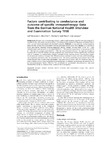2006-09-14Zeitschriftenartikel
Factors contributing to conductance and outcome of specific immunotherapy: Data from the German National Health Interview and Examination Survey 1998
Hommers, Leif
Ellert, Ute
Scheidt-Nave, Christa
Langen, Ute
Background: Allergies are an increasingly relevant public health problem. Specific immunotherapy (sIT)
is presently the only causal treatment option. This study aimed to assess the frequency and determinants
of sIT use and factors associated with treatment outcome. Methods: A cross-sectional analysis based on
data from the German National Health Interview and Examination Survey 1998. Results: 2727 (39.2%) of
study participants reported physician-diagnosed allergic disease. Among these, 16.5% (n ¼ 296)
stated to have undergone sIT. In this subset 43.4% (n ¼ 129) reported improvement of symptoms, 21.9%
(n ¼ 65) had not changed, and 34.6% (n ¼ 102) had discontinued treatment. The majority of patients
treated with sIT showed multiple allergic symptoms and sensitisations. Factors significantly correlated
with sIT treatment in multivariable analyses included rhinitis, asthma, several sensitisations, higher
social status and residence in larger cities. Rhinitis and neurodermatitis were positively, and food allergy
was negatively associated with the completion of sIT. No factors predicting improvement due to sIT
could retrospectively be identified. Conclusion: Treatment with sIT under ‘real life’ conditions does not
exactly follow current clinical guideline recommendations. In addition, patients may be selected for IT
by socio-demographic factors. Whether this contributes to considerable discontinuation rates and
limited effectiveness as observed here, needs further investigation.
Files in this item
No license information

